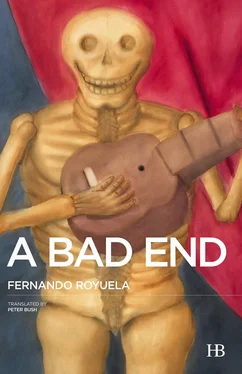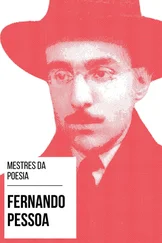Fernando Royuela - A Bad End
Здесь есть возможность читать онлайн «Fernando Royuela - A Bad End» весь текст электронной книги совершенно бесплатно (целиком полную версию без сокращений). В некоторых случаях можно слушать аудио, скачать через торрент в формате fb2 и присутствует краткое содержание. Год выпуска: 2016, Издательство: Hispabooks, Жанр: Современная проза, на английском языке. Описание произведения, (предисловие) а так же отзывы посетителей доступны на портале библиотеки ЛибКат.
- Название:A Bad End
- Автор:
- Издательство:Hispabooks
- Жанр:
- Год:2016
- ISBN:нет данных
- Рейтинг книги:3 / 5. Голосов: 1
-
Избранное:Добавить в избранное
- Отзывы:
-
Ваша оценка:
- 60
- 1
- 2
- 3
- 4
- 5
A Bad End: краткое содержание, описание и аннотация
Предлагаем к чтению аннотацию, описание, краткое содержание или предисловие (зависит от того, что написал сам автор книги «A Bad End»). Если вы не нашли необходимую информацию о книге — напишите в комментариях, мы постараемся отыскать её.
A Bad End — читать онлайн бесплатно полную книгу (весь текст) целиком
Ниже представлен текст книги, разбитый по страницам. Система сохранения места последней прочитанной страницы, позволяет с удобством читать онлайн бесплатно книгу «A Bad End», без необходимости каждый раз заново искать на чём Вы остановились. Поставьте закладку, и сможете в любой момент перейти на страницу, на которой закончили чтение.
Интервал:
Закладка:
We circus folk roamed the seven corners of the nation’s geography and noticed the same damned lust frothing behind all the barriers in the arena of Iberia. “Iberia is like a bull-skin stretched from west to east, with its front limbs pointing eastwards and its bulk stretching from north to south.” And that’s how it was. Our endless wandering across that stretch of skin gave us a privileged perspective on the evolution of lifestyles, distorted only, as is natural, by the rootlessness of our own industry and our status as adepts of transhumance. I learned who I am in those Spartan times, observing, reflecting, and feeling the hard knocks from the logs of life on my battered ribs that caved inwards. I never went to school, they wouldn’t let in the deformed, but I studied on my own from the open book of experience the only subjects that can validate human existence: love, rage, revenge, and the limitless passion to survive.
We reached a city, knocked on its doors with our clappedout megaphones, and people came to our spectacle to see us celebrate the absurd. Children greeted our japes with vicious cruelty — there were times their fingers pinged pellets at us from elastic bands — adults scrutinized our faces, and their petty minds were struck with awe as we unleashed our unrivaled jumps, pirouettes, and other feats that configured our acrobatic existence. In their amazement, they lapped up those grotesque rituals, and the eager tongues of their fantasies licked every scrap of flesh Doris adroitly offered them. The spectacle unfurled like a freak show, which is what it was, in the end, and I went from strength to strength amid all that, with my few possessions, with my nothing at all, really, and with the ice-cool pride slavery grants those who hazily glimpse that one day they will cast off their chains and stand as the indisputable kings of creation. Children are soft-skinned troglodytes who enjoy the anger they see their elders repressing. Children are beasts who enjoy watching others suffer. It was obnoxious to watch them in the front row wishing a tightrope walker would fall and snap the cable on his groin, or that a wild animal would gnash his teeth and rip off its tamer’s arm. The adults were more of the same, only with more elevated, not to say erect, thoughts. I crouched behind the big curtains that were the entrance to the ring and watched them from my hideout. They stared at the sand, and I looked into their eyes. They didn’t know it, but they were my show, the greatest show on earth, I insist, the circus of this world.
Telekinesis doesn’t exist, and I’m telling you that, and telling you convinced that it is a fact. Nor does the spontaneous combustion of people. If telekinesis existed, two-thirds of the audience at our shows in those years would have been struck in their seats by the devastating lightning of my thoughts. I wished they would be and raged in the attempt, but it wasn’t to be. The desires we experience generally stay that way, mere desires that fade and disappear like the smoke of dreams in the air of the real world. Nevertheless, one day a miracle did take place during a performance. It was in a small town in Valencia where we went for its patron saint’s feast day. It was insufferably hot and clammy in the big top. Doris was spinning through the air in looping pirouettes assisted by the hand of Gelo de los Ángeles. In one of my furtive inspections, I noticed someone in the audience following the impossible unfurling of her lightness of being through shabby, squint-eyed binoculars from the civil war. I witnessed that Peeping Tom from my little hideout behind the curtains and immediately saw what his deal was. He was a horny bastard who rather than gaze at the art of the trapeze was weighing up the parabolic dimensions of Doris’s butt and the centrifugal jiggling of her tits. He was an infantry officer in a garish uniform with a worm-like little moustache that emerged from his nostrils in a quite un-martial manner. His gesticulations betrayed the pleasuring he was after: feeding his libido and entertaining himself on the remote possibility that Doris might slip from those heights and split her head open on the sand below. He attentively followed the sequence of acts, scratching his groin on the sly, giving himself an undeserved thrill in the half-light of the tent and getting off on the risky business she was chancing up above. I wasn’t sure whether to walk over and spit in his face, or to let him enjoy himself as he wanted, but Providence solved my dilemma. I looked up and noticed a red circle wetting the material of Doris’s leotard right in the spot where it was drawn inward by her buttocks, like a virgin of yesteryear granted the gift of weeping blood, a virgin transfixed by the immense misery of humanity. Blood of the misery of a float-bearer in Holy Week, holy blood flowing from wellsprings of the suffering, dark, heavy blood of hemorrhoids soaking the Golgotha of this world drip by drip. I looked up at the sky and saw her anointed in ruby red, bedecked by a stain. Two twin drops then rained on him in unison, two drops that hit the wretched fellow ogling with such putrid lust plumb between the eyes. The brightest red was the last thing his retinas registered. The strident color of blindness.
The Culí-Culá brothers weren’t brothers, weren’t clowns, weren’t anything but faggots. Theirs was a slick act that delighted the public, a string of farts and proverbially filthy chases around the ring that always engaged the spectators. Smooth-cheeked, soppy Frank Culá ran across the sand with a clumsiness he feigned as he dodged the attempts to catch him made by bearded Juan Culí, a huge prowling bear lumbering awkwardly after him with a gigantic club on his shoulder, desperate to bash his head or wherever with his outsized bludgeon. When Frank was on the point of being captured, he’d aim a sonorous fart at Juan, the stink of which knocked him for six. It was an absurd scene, a grotesque caricature of the struggle between David and Goliath that ended with the giant prostrate on the ground, the butt of zillions of farts, protracted, vegetable efforts his captor graciously directed up his nose. Such a tour de force could only come from a premeditated souring of the intestines that the spectators found a hoot. They all laughed their bellies off during the act and, when it finished, applauded, cracked jokes, belched, and even farted gleefully, a display of flatulence and foul air in keeping with the taste of the spectacle. Juan Culí and Frank Culá made a stable item and, like the best of brothers, shared the intimate space of a caravan with an array of everyday gear for personal hygiene, leisure, and domestic life. Gillette blades, Lea shaving soap, a pockmarked set of dominoes, a depleted set of crockery, towels, bedroom linens and pajamas, and rusty cutlery that once belonged to Culá’s mother made up the bulk of their possessions. Apart from their daily labors, they shared a bed that was on the low side and very plain but didn’t blunt their diversions. The Culí-Culá brothers never showed off their homosexual condition in public, and their measured life, apart from the gross nature of their performance, did them credit and was even exemplary. They never bothered me. Nor am I trying to claim they respected me. Respect on the fringes of a life of disorder is a relative value and subject to non-codified, imprecise, changing criteria. Generally speaking, respect comes from the fear or admiration one has for others, almost never from a mere sense of the dignity that should be part and parcel of being human. In the circus, respect derived from the tried-and-tested strength and hardness of one’s character and, in my case, in equal doses from the pity I inspired or the guffaws I provoked. Juan Culí, the manliest of the duo, perhaps aimed an occasional kick at me when I crossed his path, but apart from that routine reaction, the truth is we behaved as equals. Frank Culá was, however, much shiftier, with a hidden agenda, and probably as a result always looked so two-faced I’m amazed he didn’t go cross-eyed. He’d spy on me doing my chores, I never did find out why, and now and then made lewd remarks, so hedged by warm tributes they were immediately swept away by his apologetic airs and appearance. Nevertheless, Frank Culá had the foulest of tempers, and rage coursed through his veins when he had a prey in his sights or an enemy in range. “Dwarfy, where’ve you left Snow White?” he’d ask, meaning Doris. “Haven’t you let her taste your little red apples yet?” He guessed that I was devoted to her and simply wanted to find a way to ingratiate himself in my feelings. If he sounded so coarse, it was only because he wanted to define the boundaries of his domains, as animals do with their pee. We both knew on which side our bread was buttered and, in one way or another, enjoyed that complicity. I never thought their life as a married couple was at all obscene, and it never, ever occurred to me to play them a nasty trick as a form of retaliation for their devious ways. Quite the contrary, I secretly admired the sugary warmth with which they cohabited, a warmth they fenced in behind sharp spikes and barbed wire to protect it against the rigors of the social climate. I accepted in silence the tiny caresses they indulged in when walking by, the syrupy gazes caramelizing in their eyes, the slight brushes against each other — angel wings their fingertips, an archangel’s their fluttering lashes — and at bottom they were grateful for that.
Читать дальшеИнтервал:
Закладка:
Похожие книги на «A Bad End»
Представляем Вашему вниманию похожие книги на «A Bad End» списком для выбора. Мы отобрали схожую по названию и смыслу литературу в надежде предоставить читателям больше вариантов отыскать новые, интересные, ещё непрочитанные произведения.
Обсуждение, отзывы о книге «A Bad End» и просто собственные мнения читателей. Оставьте ваши комментарии, напишите, что Вы думаете о произведении, его смысле или главных героях. Укажите что конкретно понравилось, а что нет, и почему Вы так считаете.












